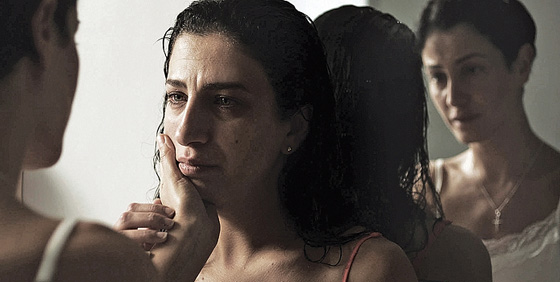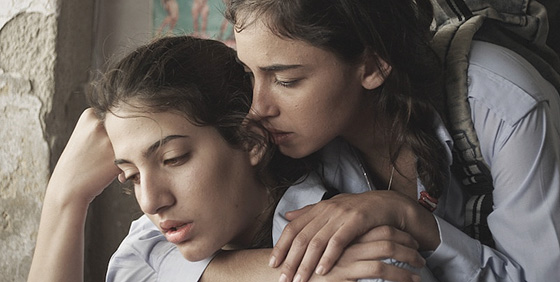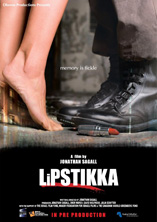
Dealing with the tenuousness and unreliability of memory, Jonathan Sagall has crafted a sophomore feature that isn’t easy to shake. An Israeli-raised, Canadian-born filmmaker, many at the Toronto International Film Festival were interested to discover why he chose to tell a story about two Palestinian women. Attempting to remain as politically correct and honest as possible, his response was a resounding, “This is a story about people”. To Sagall, his work doesn’t deal with two sides of a never-ending war or two religions at odds with one another. Whereas audience members wanted an underlying salacious manifesto of political turmoil, they received the complicated love story built around the loss of innocence found on its surface. The message would be the same if the characters were Jewish, Muslim, Christian, male, or female. Those attributes are merely details in the grand scope of the unforgettable horror soon revealed, one that has hid behind each decision Lara (Clara Khoury) and Inam (Nataly Attiya) has ever made.
Lipstikka concerns two London-based women who survived an unforgettable event back home in Ramallah as children. Reaching into the memory of that fateful day brings a flood of important events back to the surface, the answers to questions raised by their current, impromptu birthday reunion made clearer with each glimpse. Best friends from a very young age, the place they find their relationship now is strained and far removed from the inseparable team they once formed. Lara has married and given birth to a son, all while finding her marriage a sham as husband Michael (Daniel Caltagirone) is a cheat. The two sleep in separate rooms but keep the appearance of idyllic happily ever after for the neighbors until young James (Taliesin Knight) grows up. She has wealth and safety in a community far removed from the bombed out buildings of her youth, things Inam seems to have never found herself. A promiscuous woman we sense has worn out her welcome in the Johnson home, Inam’s visit goes deeper than initially believed.
Escaped to England as older teens, Lara and Inam worked hard to assimilate and move forward with their lives by attending school and leaving the Arabic world behind. Somewhere along that road, though, the two took diverging paths. Standing face-to-face now, they look at each other like strangers as time has increased the chasm between them. Inam puts on a sensual smile, reminding Lara of the love she once held and the dream to be lovers in a new life together. But those feelings are gone, even if unhappy in marriage. Lara has a life and it’s a good one; Inam’s return only risks its continued viability. What will her son say when he awakes to find this strange woman in the house? What will Michael think when he finds out as well? The tension mounts, but their bond is too strong to simply throw an old friend out. Lara must play the part and discover Inam’s motives before deciding her next move, learning she has now married and is expecting her first child too.

But keeping her close only stirs up more memories as we slide back and forth to college, Ramallah, and more. Some sequences flash quickly while others breathe—the memories acted out so we can understand what happened. The identity of Michael is expanded upon to include how he met Lara and his relationship to Inam; we look quickly at their parents, the former’s lovingly wanting what’s best for her, the latter’s mother an abusive woman to act out against; and we delve back to Lara’s long ago birthday, both girls around sixteen, and the trip to Jerusalem for the latest Mel Gibson movie. All these play decisive roles in the evolution of their lives together and individually. How they remember may differ through distortions made to cope with tragedy. Sagall shows both, juxtaposing them for us to combine with the rest of the film and solve the mystery of truth. Where one may recall the horror as a sacrifice to save their lives, the other only sees guns, violence, abuse, and evil.
Titled Lipstikka, the name stands in for the loss of innocence—the weighty metaphor it truly signifies more powerful than the make-up’s obvious transformative powers of turning a girl into a woman. If not for the lipstick stolen from Inam’s mother’s purse, the two girls may never have ventured off across the Palestinian/Israeli checkpoint, may never have been caught after curfew with papers, and perhaps would have continued to live their lives as innocent children striving for better. Sadly, this was not the case and both must grow up with the memories of that night, warping them and reconciling them to get through the day and hope to become stronger as a result. But where one falls into alcohol and the other into sex, their friendship is unable to survive the tension, their differing love for one another making a future together impossible.
We watch the emotional sabotage wrought, the games played, and the unwarranted spite thrown as Sagall shows us tidbits of information that will later be illuminated. There is Inam’s supposed inability to have children and Lara’s unlikely ability to find a man who would love her, both with causes more dangerous and amoral than our imaginations first posit. Attiya and Khoury embody their roles with immense care to their fluctuating psychology with frayed ties binding them still unbroken. Their emotive expressions and telling looks soon give way to the puzzle hidden beneath the white picket fences of suburban utopia. Attiya’s Inam is definitely the flashier performance, her manipulations and uncontrollable actions a harbinger for unknown possibilities, but Khoury’s quieter storm of emotion raises the bar as a larger—perhaps too much—truth is revealed at the end. Sagall shows complete control over his audience with a highly intelligent script that shares its details at precisely set times. The result culminating in tough visuals that resonate long after the credits roll.
Lipstikka is playing at the Toronto International Film Festival.

